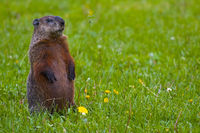A gala affair! And for the second time we were honored by the presence of Rabbi Rosenblatt. I guess that when he attended last year – for the first time in it’s 17 year history – nothing bad happened, so he felt free to come again!
🙂
My sermon follows:
Once again I find myself considering the role that the Groundhog plays in our communal life. Why, indeed, to we venerate this noble rodent, and his activities in the dead of winter? And once again I found some insight in the Parshat Hashavua.
The whole scene of the revelation at Sinai is awe-inspiring, and marked by fear. The people are separated from the mountain; shofars and thunder are heard, lightning and fire appear. In fact, once the revelation begins, the people are so overcome by fear that they flee from the scene, and beg Moshe to act as an intermediary and protect them from the awesome presence of God. The commandments themselves are primarily (though not exclusively) negative ones, with the theme of keeping away from the forbidden.
As time goes on, however, more positive aspects of Jewish belief and practice come to the fore. Ve-ahavta et Hashem Elokecha – Love god. Love the stranger, the widow, the orphan, support the poor. Eliyahu Hanavi expects to see God in the whirlwind – but is told that He is really in the still, small voice. Ultimately, the rabbis tell us that love of god is a higher ideal than fear of Him. And the essence of the messianic idea is one of hope for a better future and a world based on truth and love.
The groundhog’s struggle each February represents the tension between fear and hope, yirah and ahava. The rodent pokes his head out of his hole, where he has been hididing from the cruelty of winter. He can only do so because, deep within his furry soul, he harbors a dream – the hope that the salvation of springtime will arrive. We never know from year to year which will triumph, winter or spring. Will the fear of his shadow drive the groundhog into the depths again? Or will hope overcome fear, heralding the release from the cold, the hunger, and deprivation of body and soul? Whatever the answer in each individual year, we take comfort in knowing that by observing and celebrating this struggle year after year after year, we express the hope that ultimately, the travails of the winter of this world will be overtaken by a springtime of redemption, Bevias Goel Tzedek Bimhera Biyameinu.
